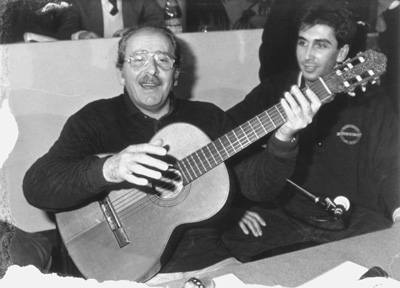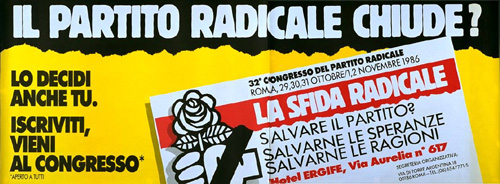|
|
|
In confirming the contents of the "Pannella" resolution passed by the preceding congress (31st) that asks the party organs to prepare the suspension of its activities, the XXXIInd Congress must, however, take note of some important new factors: the growing awareness in the country of the decline of the institutions; the growth of consensus, expressed in terms of membership, with the PR's solitary announcement. Five thousand people, in fact, became registered PR members, among them many prominent figures of the world of culture and other political groups. The motion therefore commits the party to pursue a campaign to reach a membership of 10,000 by the end of the current year and of 5,000 members by January 31, this being considered the minimum threshold in terms of resources for confronting the stated political obstacles. Should the objective not be reached it commits the organs to proceed with the dissolution of activities. The XXXIInd Congress is then reconvened for its second session in February 1987.
The XXXIInd Congress of the Radical Party, on the 30th anniversary of its founding, after thirty years of political, civil, democratic and non-violent battle which has made extraordinary contributions to the society, the country and enforced law; taking note that the analyses and conclusions contained in the resolution passed by the XXXIst Congress are and remain entirely valid; ascertained that the party of civil and human rights, of internationalism and the affirmation of individual conscience, of European federalism and the fight against death from starvation, of democracy and non-violence, of law and "proper justice", and of ecological battles has been placed in a position of not being able to present its own candidacy or propose new political objectives except at the cost of consigning itself to certain defeat, of making its values and ideals appear democratically in the minority and marginal, and to legitimate - by participating in it - the anti-democratic game and its results. The Congress declares that new and important facts have been verified in the course of 1986 thanks to the work of the Radical Party, thanks to the clear and courageous choice of President Enzo Tortora, but thanks as well to the awareness of the decline of law that has at times been manifested within the institutions and in the most significant way by declarations and formal acts of the Head of State, thanks to the referendums and the various political consenses that have made them possible, thanks to the new dialogue that has been opened with the Socialists and lay parties, and with all those militating in other parties and associations who are not resigned to the reduction of politics to a mere fight for power for its own sake. But none of these facts is per se strong enough to overturn the non-democratic conditions and the upsetting of the institutions and the constitutional guarantees. Anyone - even at the summit of the Republic - within the institutions or the parties who moves in this direction risks remaining isolated and being reduced to the status of an impotent witness by the party-rule mechanisms just as has happened to the Radical Party. With the Congress and in the Congress more than 5,000 people have joined the party, more than 2,000 of them in the month of October alone - an extraordinary event that has no precedent in the history of the Radical Party. This has been made possible, despite the public service of the RAI-TV (national radio-tv, ed.) denied us, by several important information services made available for the first time by newspapers and TV broadcasters, thanks to which a part of public opinion was able to learn of the grave conditions in which the Radical Party was obliged to conduct its political battles. The thousand new members, which include many dual memberships on the part of Socialists, Liberals and other parties, and prominent names from the worlds of culture, show business, jurisprudence, and the many who, as they suffer imprisonment, have found new grounds for dialogue and new hope in the Radicals' struggles - all these already today have changed in growth and strength this Radical Party, and they may perhaps represent the vanguard and herald the arrival of that great democratic Party that could take on extraordinary and overwhelming size and quality only if the right to information and comparison of ideas and political proposals were to be respected and made practicable. In greeting and thanking them, the Congress considers that these memberships and this participation are the richest and most vital reply to the appeal to save - along with the party - its hopes and its reasons for being. The Congress decides to protract the mandate of the party organs so that they can continue and intensify the membership campaign until December 31, with the objective of reaching and exceeding the 10,000 member mark, considered the threshold, the indispensable minimum for confronting difficulties and obstacles that will otherwise be insurmountable. Such an objective must be pursued with an extraordinary mobilisation directed at obtaining "reparations" for the censorship, the distortions, and the silences that have accumulated over the years, and at beginning to reacquire the observation of those minimum rules of the game necessary for democratic processes to take place (according to the Constitution). Therefore the Congress asks the party organs to draw up immediately a project for action and struggles that will allow for a dialogue with the institutions and the other parties on various points of the Resolution, in order to remove at least some of the worst obstacles to the very possibility of practising any democratic initiative. In this context - of democratic dialogue and non-violent struggle - the party will have to gather and study the important signs of attention and of readiness to collaborate that have been given to the Congress, in particular by the PSI, the PLI, and the PSDI (Socialist, Liberal, and Social Democratic Parties, ed.) If by the end of 1986 such an objective should not have been reached, the Congress decides to proceed with the dissolution of the Radical Party's activities, the responsibility for which, until complete dissolution, will be entrusted to a committee composed of all the ex secretaries, ex treasurers, and ex presidents of Federative Council besides those presently in office, as well as all the members of Parliament elected on the Radical lists who were registered members of the Radical Party when the Congress convened. The strengthening of the Radical Party cannot be an isolated factor limited to 1986, but must be immediately confirmed and consolidated in 1987, a decisive year for guaranteeing the organised strength necessary for Radical initiatives. Therefore, by January 31, at least 5,000 registered members must be obtained for 1987. If that objective too is reached, the organs of the Radical Party will have to reconvene the Congress in February 1987. Contrarily, the dissolution of party activities will take place in the manner described above. Not only consolidation and growth must take place, but a veritable explosion of the strength of the party of democracy and law are indispensable for confronting the degradation of the State under law, the absence or the upheaval of the rules of political confrontation. Only upon and around such a force can the citizens again find reasons for placing their hopes in the future of the Republic. |

